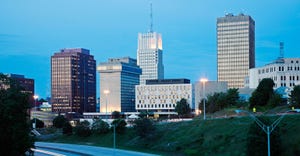Ann Arbor, Mich., Seeks New Recycling Contractor Amidst Lawsuit with Ousted ReCommunity
Ann Arbor, Mich., City Spokesperson Robert Keller shares what the municipality is doing to divert waste in the meantime.
“It was a matter of safety. That is what it is about and what it’s always been about,” says Ann Arbor, Mich., City Spokesperson Robert Keller of the city’s recent decision to fire N.C.-based ReCommunity, which handled the municipality’s recycling for 20 years.
Keller will not comment further right now, as the case is tied up in litigation; ReCommunity is suing the city for its termination. But Keller said plenty about what the municipality is doing to divert waste in the meantime, including its plans moving forward and its overall recycling philosophy.
For the next six to eight months, the City of Ann Arbor has a request for proposal on the street for a contractor to manage its recycling operations. In the meantime, the city is working off of a contingency with Waste Management to keep its MRF up and running. In addition to that, a consultant is looking at the city’s recycling process to re-assess the existing business model and contract structure for operating the recycling plant.
As the city shops for a new operator, there has been discussion over other tweaks in the way the city manages its waste, namely to pump its organics program and improve multifamily home recycling. And it could be making some big changes in how it deals with glass.
The City of Ann Arbor is looking hard at its current curbside composting program to divert both food and yard waste. It has formed residential and commercial advisory groups to determine how to increase collections from businesses and restaurants.
Working with Recycling Ann Arbor, the city’s longtime residential and business recycler, the city is assessing how to increase recycling in general.
Recycle Ann Arbor, created by the city, did a recent pilot study on multifamily recycling with results pending.
“Being a college town, especially, we have a lot of multifamily dwelling units, and recycling [in this residential model] has been a challenge for us,” says Keller.
“With single family, it gets routine. People know what to do and get accustomed to doing it. With a transitory population, people leave and someone else comes in. The challenge is to get them to understand the benefits and to participate,” he says.
One of the decisions the city is weighing is whether to invest in glass moving forward.
“We are still accepting glass. We reuse it as landfill cover because we can’t pay people to take it,” says Keller.
The City of Ann Arbor gets about $1.50 a ton for cover. Once it has a long-term contract in place to manage the MRF, it will continue to use the glass in this capacity. But, says Keller, “While we do it for now, we have to look at if we want to continue long term.”
As far as the ReCommunity upheaval goes, Sean Duffy, the company’s president and CEO, has said that officials cut long-running ties with the company because the city was losing money as commodities’ value plummets.
“When the markets turned and they had to pay us $20,000 or $30,000 a month, everything changed," Duffy told Resource Recycling. He blames operational problems on old equipment’s inadequacy, arguing that the baler was in bad shape and ReCommunity pushed for a new one for two years.
City Administrator Howard Lazarus had stated that officials believed operational issues were largely the result of ReCommunity exceeding plant capacity.
While the City of Ann Arbor will not respond directly to the money-saving accusation, Keller states that the city is not running recycling based mainly on market forces.
“If you did, you’d have to change your recycling method every six months. After educating the community, you would have to go back and change what they can or cannot recycle. That is a recipe for disaster,” he says.
Beyond the need for a consistent plan even through shaky economics, money just is not a main factor, he claims.
“The community indicated that whether we break even, make money or are at a loss is not parameters for our decision making,” says Keller. “The City of Ann Arbor does not look at [recycling] as a revenue generator, but as a community value. It’s part of our sustainability goals.”
Meanwhile, the municipality has exceeded its set recycling goal. Its target was to divert 40 percent of its waste stream by 2017, a rate the city hit in 2013.
About the Author
You May Also Like


.png?width=300&auto=webp&quality=80&disable=upscale)

